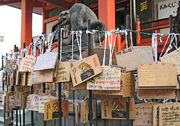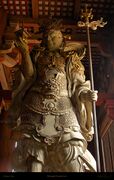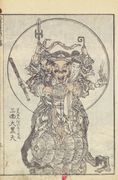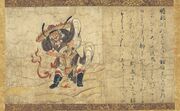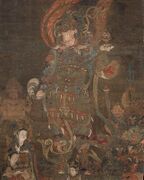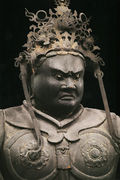Bild:Tohachi hanabusa.jpg: Unterschied zwischen den Versionen
Zur Navigation springen
Zur Suche springen
| (8 dazwischenliegende Versionen von 4 Benutzern werden nicht angezeigt) | |||
| Zeile 1: | Zeile 1: | ||
| − | {{ | + | {{Bild |
| − | |titel = | + | |titel=Tōhachi Bishamon-ten |
| − | + | |genre=Hängerollbild | |
| − | | | + | |detail=0 |
| − | |detail=0 | + | |material=Seide, Farbe, Gold |
| − | + | |artist=Hanabusa Ikkei | |
| − | + | |zeitalter=Neuzeit | |
| − | |material= Seide, Farbe, Gold | + | |periode=Edo-Zeit |
| − | + | |jahr=1832 | |
| − | |artist= Hanabusa Ikkei | + | |q_link=https://www.britishmuseum.org/collection/object/A_1881-1210-0-86-JA |
| − | | | + | |q_text=The British Museum |
| − | |periode= | + | |c=cc |
| − | |jahr= 1832 | + | |quelle_d=2021/12/17 |
| − | + | |beschreibung={{gb|Bishamonten}} mit vier Köpfen und zwölf Armen, die acht Schwerter eine Pagode, ein Juwel, eine Sutrenrolle und einen Vajra halten. Er reitet auf einem Löwen und hat einen Löwenhelm, auf dessen Spitze ein Buddha thront. Dahinter das „Rad der Lehre“ mit acht Speichen. | |
| − | |||
| − | |||
| − | |||
| − | |||
| − | |q_link= | ||
| − | |q_text= The British Museum | ||
| − | | | ||
| − | |quelle_d= | ||
| − | | | ||
| − | | | ||
| − | |||
| − | |||
Zu Hanabusa Ikkei 英一珪 schreibt das British Museum: | Zu Hanabusa Ikkei 英一珪 schreibt das British Museum: | ||
Ikkei was the leader of the Hanabusa school, and offshoot of the Kano school, founded by Itcho in the early 18th century. He gives his age as eighty-one (dating the painting to 1829) and says he is copying an image from Tomon-in Temple, Moriyama in Omi Province. Further documents suggest that the painting was commissioned by one Nagaoka Yasushige and dedicated at the New Year, 1832 by Nikkyo Shonin of Ikegami Hommon-ji Temple, Edo. | Ikkei was the leader of the Hanabusa school, and offshoot of the Kano school, founded by Itcho in the early 18th century. He gives his age as eighty-one (dating the painting to 1829) and says he is copying an image from Tomon-in Temple, Moriyama in Omi Province. Further documents suggest that the painting was commissioned by one Nagaoka Yasushige and dedicated at the New Year, 1832 by Nikkyo Shonin of Ikegami Hommon-ji Temple, Edo. | ||
| + | |thema=Glücksgottheit | ||
| + | |medium=Malerei | ||
| + | |inhalt=Gottheit | ||
| + | |form=Malerei | ||
}} | }} | ||
Aktuelle Version vom 14. August 2022, 15:30 Uhr
Bildseite:Tōhachi Bishamon-ten
- Hängerollbild (Seide, Farbe, Gold). Werk von Hanabusa Ikkei, Edo-Zeit, 1832. The British Museum. Letzter Zugriff: 2021/12/17
Bishamon-ten mit vier Köpfen und zwölf Armen, die acht Schwerter eine Pagode, ein Juwel, eine Sutrenrolle und einen Vajra halten. Er reitet auf einem Löwen und hat einen Löwenhelm, auf dessen Spitze ein Buddha thront. Dahinter das „Rad der Lehre“ mit acht Speichen.
Zu Hanabusa Ikkei 英一珪 schreibt das British Museum:
Ikkei was the leader of the Hanabusa school, and offshoot of the Kano school, founded by Itcho in the early 18th century. He gives his age as eighty-one (dating the painting to 1829) and says he is copying an image from Tomon-in Temple, Moriyama in Omi Province. Further documents suggest that the painting was commissioned by one Nagaoka Yasushige and dedicated at the New Year, 1832 by Nikkyo Shonin of Ikegami Hommon-ji Temple, Edo.Bildverwendung:
- Bishamon-ten: Wächter und Glücksgott (Kapitel „Essays“)
Schlagworte:
- Thema: Glücksgottheit
- Medium: Malerei
- Künstler: Hanabusa Ikkei
Dateiversionen
Klicken Sie auf einen Zeitpunkt, um diese Version zu laden.
| Version vom | Vorschaubild | Maße | Benutzer | Kommentar | |
|---|---|---|---|---|---|
| aktuell | 22:37, 23. Feb. 2012 |  | 545 × 800 (79 KB) | Bescheid (Kommentar | Beiträge) |
:
Dateiverwendung
Die folgenden 10 Seiten verwenden diese Datei:
